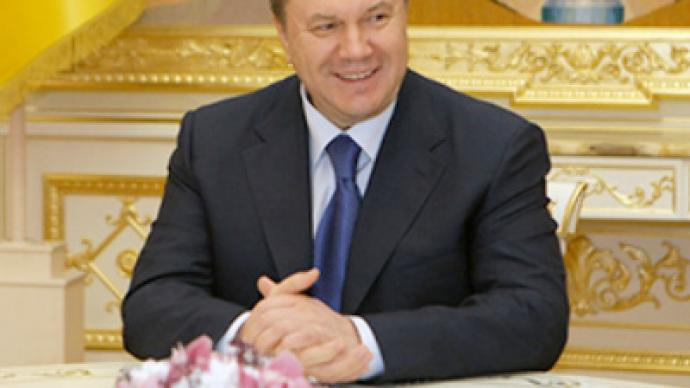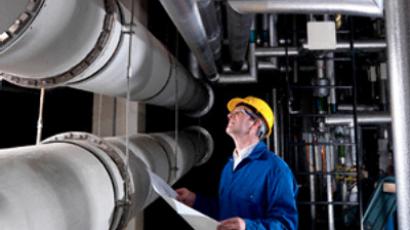Ukraine’s leader turns 60, but presidency still in infancy

Ukraine’s President Viktor Yanukovich has turned 60. His few months in power have already yielded quite positive results both in relations with Russia and the West, but what can be expected in the future?
Congratulations to the Ukrainian leader are flocking to the country from East and West. His Russian counterpart Dmitry Medvedev greeted the hero of the day in a telephone conversation as well as sent him a message.
“I appreciate the trust-based relations between us that provide for a frank discussion and effective settlement of tasks concerning further development and consolidation of the historically close ties between Russia and Ukraine,” the Russian president’s letter reads.
Since the very beginning of his presidency, Yanukovich has been striving for balanced relations with the West and, also, its former Soviet republic neighbors.
“Ukraine boosts mutually advantageous economic cooperation with CIS member-states taking into account its strategic course for EU integration and Ukraine's obligations within the framework of the World Trade Organization,” President of the European Council Herman Van Rompuy said on Friday at the meeting.
According to the country’s leader, Kiev “hopes for long-term, pragmatic and mutually advantageous relations with Russia,” Itar-Tass writes. He added that his country invited Russia to take part in upgrading the Ukrainian gas pipeline network together with the EU.
Yanukovich has only been on the presidential chair since February this year, but seems to already have reached positive results in his policies.
Last week, the US Secretary of State paid a visit to Kiev to talk further cooperation between Ukraine and the US. That followed a noticeable show-up at the US nuclear summit in April this year. During his face-to-face meeting with American president Barack Obama, Yanukovich announced about Ukraine’s intention to give up its stock of highly enriched uranium.
Four months in power
So what has been the most significant result of Yanukovich’s presidency so far, and what can be expected in the future?
According to Aleksey Makarkin, the first vice-president of the Center of Political Technologies, his main achievements are the improvement of relations with Moscow and bringing stability to the work of Ukraine’s government backed by the majority in the parliament.
When his predecessor Viktor Yushchenko was in power, Russian-Ukrainian relations were strained and practically frozen on the presidential level. The gas issue used to be one of the main stumbling blocks.
“Now these problems have been solved and a compromise has been reached,” Makarkin said.
In April, Russia’s president Dmitry Medvedev and Viktor Yanukovich signed a law on ratification of the Agreement to extend the Black Sea Fleet’s presence in Crimea after 2017 for another 25 years.
“Gas in exchange for fleet: this deal has been generally approved both in Russia and in Ukraine,” Makarkin told RT. Of course, a lot more people in Ukraine than in Russia oppose the agreement, he noted, but the majority of the population does support it.
“That became possible because the nature of relations between the presidents has changed,” the analyst said.
Also, the new Ukrainian leader “has managed to create a rather stable society”. After a stability in the government was reached, it has finally got an ability to function efficiently and “pursue reasonable policy”, which was not the case when Yushchenko was in power.
Medvedev and Yanukovich “ended de facto Cold War”
Fyodor Lukyanov, editor in chief of the journal Russia in Global Affairs, agreed that relations between Moscow and Kiev have changed radically.
“The de facto Cold War has been over which was going on almost all the time when Yushchenko was in power. The sides have moved on to an active search for grounds for interaction,” he told RT. That search, however, is at the very beginning, and now “it is not clear yet how it will end.”
“What Yanukovich and Medvedev have done is they removed the two major delayed-action mines which threatened to result in very serious conflicts. Those were the gas issue…and the [Black Sea] problem,” Lukyanov said.
“Now that the problems have been settled, the two sides can look for platforms for cooperation,” he said. “Currently, it is difficult to say what those would be, since his first month [in power] Yanukovich was busy with consolidating his power and, I believe, has been rather successful in that.”
At least now, Lukyanov says, “there is nothing that the opposition could set against his policy”. And, he added, the opposition’s activities have not been that evident lately. “It is yet a question whether it will last forever, but I believe the demoralization [within the opposition forces] is rather serious.”
The local elections that will take place in autumn this year will become an evaluation of Yanukovich’s activities, Lukyanov added. “If he strengthens his positions then, it will indicate that he will stay [in power] for a long time.” But if in some regions Yanukovich loses support, “that will become a precondition for an uprising of serious opposition.”
Foreign policy: balancing between East and West
As for Ukraine’s foreign policies, both Makarkin and Lukyanov agree that Kiev will try to find a balance between the East and the West.
“I believe that Ukraine will continue building good relations, but, at the same time, will not abandon relations with the West,” Makarkin said.
According to Makarkin, Kiev will “not annoy” Moscow. He reminded that Ukraine has already dropped its previous plans of joining the North Atlantic Alliance – which was a major irritant in relations with Russia. “At the same time, Ukraine will keep maintaining partnership relations with the US and the European Union,” he added.
It is very much likely that Kiev will be cautious in issues related to its economy. “For instance, the creation of joint ventures between Russia’s Gazprom and Naftogaz of Ukraine can be an option. At the same time, Ukraine opposes Gazprom taking over Naftogaz,” Makarkin said.
Also, it should be understood that “Ukraine will not recognize the independence of South Ossetia and Abkhazia.” The country’s joining the Customs Union – which was recently created by Russia, Kazakhstan and Belarus – is also not possible, Makarkin believes.
Aleksey Makarkin underlined that Moscow should not have “steep demands” in its relations with Kiev since even though the country will keep developing neighborly relations with Russia, its government is “pro-Ukrainian and we should realize it.”
Fully depending on Moscow is not Yanukovich’s plan
As a result of its geographical position, Ukraine cannot choose between one and another direction, but has “to keep balancing,” Lukyanov told RT. “An attempt to get off with a jerk into one side – President Yushchenko’s experience proved – would bring bad results,” he said.
According to the editor in chief of Russia in Global Affairs, Yanukovich might try to revoke policies that former President Leonid Kuchma pursued, “who tried balancing – leaning slightly to Russia,” and maintaining relations with Europe and the US. “I believe there is no other possible way for Ukraine. Obviously, fully depending on Moscow is not among Yanukovich’s plans,” Lukyanov said.
At the same time, Lukyanov noted, Moscow is being very active in working with Ukraine. “According to the frequency of contacts, both on the highest level and on the level of prime ministers …a very active bargaining over conditions in all possible fields is currently under way,” he said. Time will show, the analyst went on, if the talks bring any results.
What should be taken into consideration is Ukraine’s extremely difficult economic situation and there are not too many places for the country to appeal to for help. “Russia is a potential source of help and economic support. The EU has quite a few problems of its own…the same with the International Monetary Fund. As for the US – they have never actually helped directly,” Lukyanov said.
Natalia Makarova, RT













